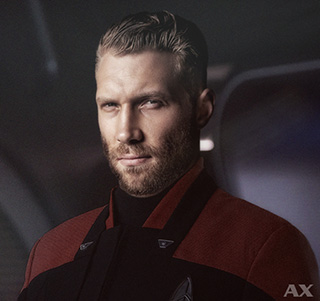Dashing out of his retreat in the captain’s ready room, Holmgren was still brushing crumbs out of his goatee when his boots were trodding across the purple carpet. He held a small espresso cup and he slurped the last of its ambrosia, hoping not to burn his tongue in his haste.
Urgently, Holmgren asked, “Did I miss it?”
From their stations around the widely-set command centre, the bridge crew offered Holmgren a combination of polite headshakes, raised eyebrows and confused expressions. Holmgren supposed they were either surprised by the way he worded the question or how much vocal heft he had placed upon it.
The first to answer was Lieutenant Calumn, Holmgren’s chief diplomatic officer. While research vessels like the Olympic rarely parlayed with foreign governments, the large Romulan Free State contingency aboard ship had quickly proven Calumn’s advice would be invaluable to Holmgren.
“No, sir,” Calumn said. Cheekily, he added, “That is to say: we’re not there yet.”
“Someone call Commander Ache to the bridge,” Holmgren requested. “She’s not going to want to miss this.”
Holmgren navigated the ring of railings that separated the perimeter bridge consoles from the three chairs in the central command well. Calumn was already seated in his typical posting to the left of the captain’s chair, and Holmgren’s Number One was stationed at tactical, rather than the chair to the captain’s right. As soon as Holmgren sat in the centre chair, he discovered Calumn had prepared another cup of espresso for him already.
Captain Holmgren’s Personal Log, Supplemental:
They say leadership is one of those competencies that comes to you gradually, and gradually, and then suddenly. When the Olympic first set course for the Ullho system with our Romulan Free State escort, Vishatha, I was still chaffing against the captain’s seat. I don’t think I even noticed when the tipping point happened for me. I know– I remember there were weeks when every decision I made was agonising. The weight of the potential outcomes was too heavy and my scales were uncalibrated. I don’t remember when I stopped thinking about it so much and just started doing it?
It’s getting to the point… I almost can’t remember my life as a science officer. I think I had lost my way towards the end there. When Taes started pushing me towards the command track, I can’t say I was running towards a career in red. Rather, I was running away from science.
Stationed at the forward Operations console, Lieutenant (Junior Grade) Szerda poked at a small holographic LCARS pop-up that projected above her station. She swivelled her chair to look back at Holmgren. The uncertainty in her eyes was more pronounced than when he’d questioned the bridge crew moments earlier.
“Captain,” Szerda reported, “We’re receiving a hail.”
Holmgren crossed his left ankle over his right knee and he tentatively raised his new cup of espresso to his lips.
Before he took a sip, Holmgren asked, “Is Commander Cokitha getting as impatient as I am over on the Vishatha?”
“No, sir,” Szerda haltingly said. “It’s text-only, coming from the Ullho system.”
Straightening his posture at that, Holmgren planted his boots on the deck and set aside his cup. He winced the way he might when he would read two sets of sensor logs that were incompatible.
“From the uninhabited Ullho system,” Holmgren remarked. “This better be good.”
“Three words,” Szerda explained. “And I quote: Ullho is extraterritorial.”
Calumn scoffed. “According to whom?”
“Sirs, I regret interrupting–” Ensign Aloyye spoke up meekly from the flight control station by Szerda’s side. By the time he said that much, the streaking starlight on the viewscreen flashed away. The Olympic’s position in space left a green planet dominating a third of the screen: that and the relatively stationary view of stars beyond. Moments later, the warbird Vishatha flashed into view as it dropped out of warp too.
Moments later, bright orange beams of directed energy flashed across the viewscreen. Each beam evidently struck the Olympic with strong nuclear forces, because the deck rocked as if they were a sailboat in a storm. Concurrently, three EPS conduits exploded around the bridge and the Olympic’s superstructure groaned. More orange flashes across the viewscreen sent the deck shaking violently. The transparent MSD behind the tactical station exploded, launching polyduranide and crystal membrane shards in all directions. Holmgren looked back to see a structural pillar come crashing down.
When I recovered from my coma, I didn’t crave holonovels or sleep or my daughters doting on me as if I were two-hundred years old. I went back to work. Deep Space 17 was expanding its first contact department and I thought that would excite me. How wrong I was. That role chaffed against me and it never got gradually easier. Something was different; something had changed. I think… I think I lost something when I was in that coma. I lost my spark. Preparing a team for first contact didn’t excite me; in fact, forming my own hypothesis and logical leaps was getting harder. I didn’t have the spark. After my trauma in the body swap with Doctor Nelli, I came back wrong.
In the days to come, Holmgren would struggle to remember what happened next. His field of vision narrowed to a sliver and his hearing became just as muffled as if he were on the other side of a door. His mind seized up; it felt awfully similar to the agony of being trapped in Nelli’s body with no faculties to interpret the sensory input. He thought he heard someone call for red alert; god, he hoped someone raised the shields. As more phaser blasts came, Holmgren believed the Olympic had tried to fight back, to defend itself. Maybe. Maybe medical personnel reported to the bridge. Someone got in his face. Someone did.
Absolutely frozen in indecision, Holmgren waited for the battle to reach its end.

 Bravo Fleet
Bravo Fleet








